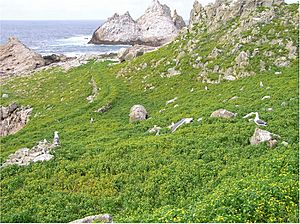Maritime goldfields facts for kids
Quick facts for kids Maritime goldfields |
|
|---|---|
 |
|
| Farallon Islands, California: a hillside covered in L. maritima | |
| Scientific classification | |
| Kingdom: | |
| (unranked): | |
| (unranked): | |
| (unranked): | |
| Order: | |
| Family: | |
| Tribe: | |
| Genus: |
Lasthenia
|
| Species: |
L. maritima
|
| Binomial name | |
| Lasthenia maritima (A.Gray) Ornduff
|
|
| Synonyms | |
|
Baeria maritima |
|
Lasthenia maritima is a special kind of flowering plant. It belongs to the daisy family. People often call it maritime goldfields or seaside goldfields because of its golden flowers.
Contents
Where Maritime Goldfields Grow
This plant grows naturally along the coast of western North America. You can find it mostly on small, rocky islands in the Pacific Ocean. Its home stretches from Vancouver Island in British Columbia all the way down to the Farallon Islands near San Francisco Bay Area in California.
How This Plant Adapted to Island Life
Lasthenia maritima likely developed from another plant called Lasthenia minor. It has special features that help it live on these windy islands. The plant can handle strong winds and salty ocean spray. It also grows in thin soil, which is often moved around by seabirds. The soil can also be acidic and rich in nitrogen from bird droppings.
Even though it grows in a small area, this plant is very common on the Farallon Islands. It plays an important role in the lives of seabirds there. On these islands, people sometimes call it Farallon weed.
What Maritime Goldfields Look Like
Lasthenia maritima is an annual herb. This means it lives for only one growing season. It has short stems that lie flat or spread out. Its leaves can be up to 9 centimeters long. They are often thick and can be lobed or smooth.
Flowers and Seeds
The plant produces flower heads. These heads are surrounded by hairy phyllaries, which are like small leaves. Each flower head has 7 to 12 golden ray florets. These are the petal-like parts, and each one is about 3 millimeters long.
After the flowers bloom, the plant produces a small, hairy fruit. This fruit is called an achene. It often has a brownish, fluffy top called a pappus.
 | Leon Lynch |
 | Milton P. Webster |
 | Ferdinand Smith |

